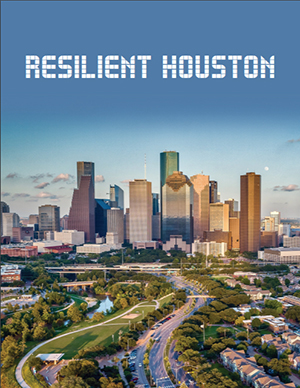No traffic deaths on Houston streets, 4.6 million new trees, and no more homes in the floodway. All by 2030.
Those are some of the lofty goals set in the master resiliency plan, “Resilient Houston,” that Mayor Sylvester Turner and city officials unfurled Wednesday, a 186-page document that spells out how the city and its residents can orient themselves to best prepare for future disasters like Hurricane Harvey.
The plan addresses resiliency at five scales — people, neighborhoods, bayous, the city and the region — and sets 18 targets, along with a corresponding set of 62 actions to make those happen.
“There’s a lot in there,” said Marissa Aho, the city’s chief resilience officer, who has spearheaded the production of the plan over the last 18 months. Aho was hired from Los Angeles, where she developed a similar framework.
About a third of the actions are initiatives the city already has in the works. Another third build on existing city projects, and the remaining actions are new.
They range from the immediate term, such as the appointment of resilience officers in each city department this year, to the more distant future, such as reaching complete carbon neutrality by 2050.
As noted in the story, the Resilient Houston plan document is here. It’s 186 pages, so I hope you’ll forgive me that I’ve only skimmed the beginning of it. The eighteen goals of the plan are laid out in the table of contents on page 3, and they include items that ought to have wide consensus like “We will support Houstonians to be prepared for an uncertain future”, “We will live safely with water”, and “We will modernize Houston’s infrastructure to address the challenges of the future”. I’d encourage you to look and get a feel for what it’s about. This is part of a worldwide effort called 100 Resilient Cities, of which Houston is now a member. It’s going to take me some time to process all this, and now I feel like I want to do an interview with Marissa Aho once primaries are over. At a high level, I think this is a good and necessary thing, and I think the goals are both desirable and achievable. How we get there will very much be the tricky part.


If you do an interview with this person, there are several questions that I would like you to ask on my behalf, such as, you came from Los Angeles, with a much different set of challenges, how are you going to adapt to Houston? How resilient can a city be when it is built on montmorillonite and has no bedrock? Is increased development and the increase in impervious ground causing the annual flooding, or do we attribute this totally to climate change? Why is the city unwilling to take steps to slow down and reduce motor vehicle traffic? I did look at some of the report, and one of the main solutions is training people to do it themselves, is this a proven strategy? I have other questions, too, if you would like me to send them, please write to me.